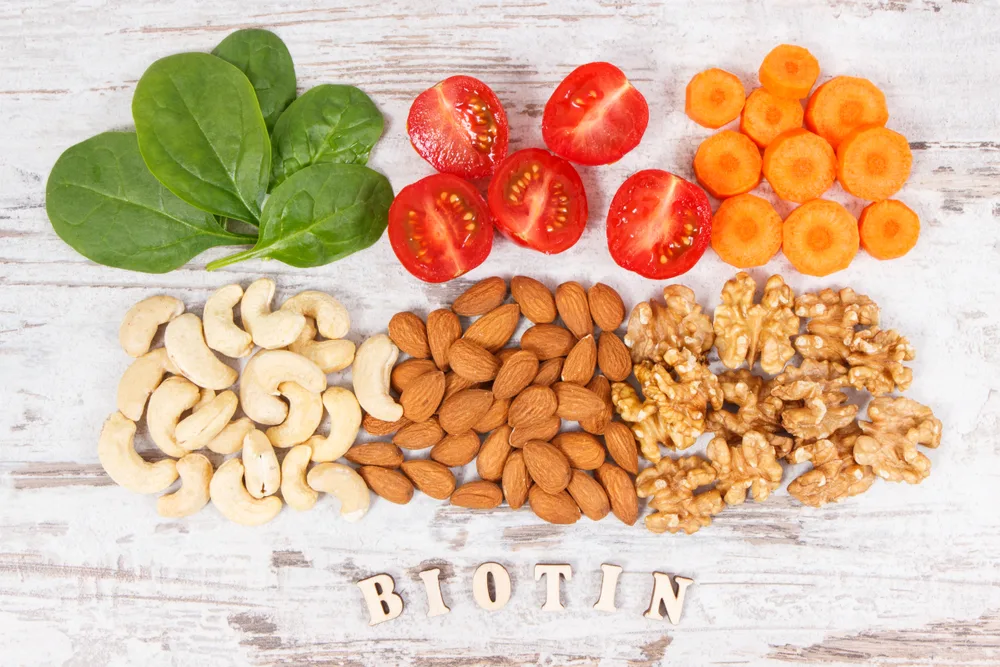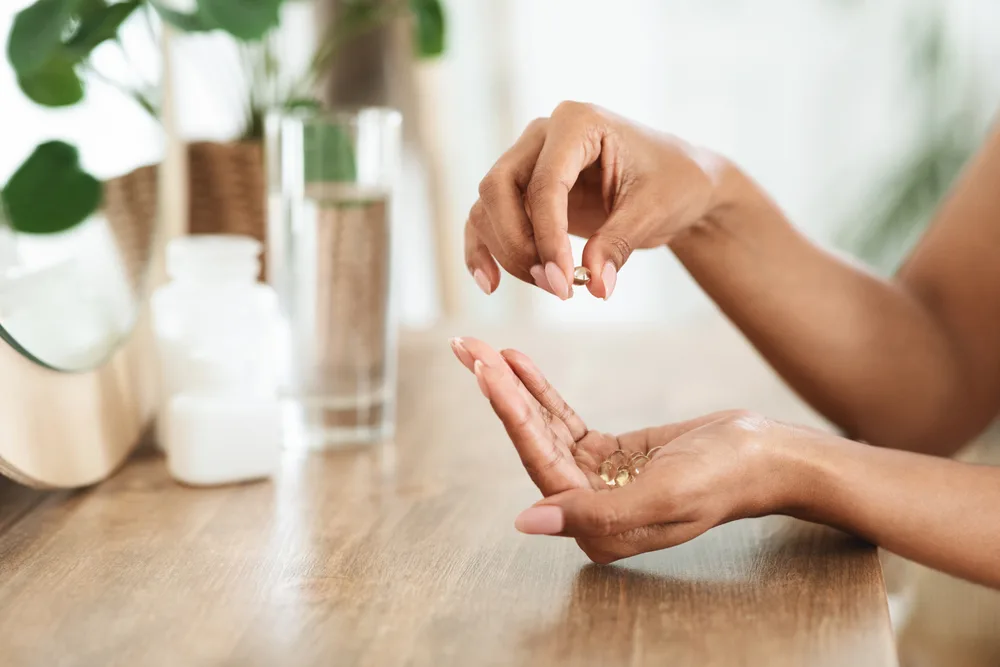Jump to:
Biotin is often touted as one of the best vitamins that women can take, but what exactly does that mean, and how are we supposed to use it? How much should we take, and what is the best time to take biotin?
We must take care of our bodies by providing proper nutrition, so these are vital questions to answer.
When Is the Best Time to Take Biotin?
There isn’t a specified time of the day to take biotin. However, we don’t recommend taking it at night. Biotin, or Vitamine B, usually raises our energy levels, which is not ideal for the evening period.
Unless you are more active at night for personal or professional reasons. In this day and age, we are bombarded by a wide variety of multivitamins, supplements, powders, and more.
It can be challenging to tell which ones we should pay attention to and which we should toss aside. One of the many vitamins we recognize today is biotin. Biotin is a very popular supplement, especially among women.
Below, we’ll take a closer look at some specific aspects of biotin that may be helpful to you:
- What is biotin?
- Are there benefits to taking biotin?
- When should you take biotin?
These are crucial questions to answer, so let’s get into it.
Read Next: How Long Does It Take for Biotin to Work?
What Is Biotin?

Ratmaner/Shutterstock
Biotin is another name for vitamin B7. This vitamin is found naturally in many foods, including:
- Eggs
- Milk
- Legumes
- Nuts
- Broccoli
- Liver
- Sweet potatoes
- Mushrooms
- Bananas
Even though vitamin B7, or biotin, can be found in plenty of common foods, some people suffer from biotin deficiency. A deficiency plainly means you’re not getting enough of a defined nutrient in your body. Though rare, a deficiency can lead to several health issues.
Biotin supplements can help provide additional biotin in your regular diet through a capsule, tablet, gummy, or liquid form. The best biotin supplements come from high-quality manufacturers and lack fillers and additives.
Read Next: Which Vitamins Are Good for Your Hair Growth?
The Benefits of Taking Biotin
The chief function of vitamin B7 is to help metabolize food. However, the beauty industry has named it an end-all, be-all solution to things like brittle nails and hair loss.
A biotin deficiency can indeed lead to rash, weak nails, and hair loss, but let’s take a look at some of the potential benefits of taking a biotin supplement.
Hair Health
One of the most mainstream benefits of taking biotin is hair health. Some people believe that taking biotin can help increase hair growth, but the primary benefits to your hair include more strength, better shine, and added volume.
Skin Health
Biotin is highly popular in the beauty industry for its impact on hair, skin, and nails. Some research shows that biotin can help soothe dry, irritated skin. It may also add some protection against things like infections and acne.
Nail Health
One of the main signs of a biotin deficiency is brittle nails. Therefore, it makes logical sense that taking a biotin supplement can help turn that problem around.
Even in healthy individuals, adding a biotin supplement to your diet can help improve overall nail health, strength, and growth due to its involvement with the body’s cell functions.
Healthy Pregnancy
Most doctors recommend taking extra caution when it comes to using supplements during pregnancy. Aside from prenatal supplements, there is little research on other products and their impact on pregnancy.
But biotin, or vitamin B7, is known to be very helpful for a healthy pregnancy. Pregnant women require this vitamin for the health of their baby, and a deficiency can lead to health issues.
Healthy Metabolism
Ensuring you’re taking in enough biotin can play a crucial role in having a healthy metabolism. Biotin helps convert food into energy, which is not only necessary for a functioning body, but it’s also needed to stimulate your metabolism.
In fact, biotin does a good job utilizing sugars that come from your diet. Good biotin levels may help combat the early onset of type 2 diabetes in the long run.
Does It Matter When You Take Biotin?

Prostock-studio/Shutterstock
The best way to take biotin is to follow the directions on the packaging. You may have also received additional instructions from your healthcare provider if you discussed biotin with them beforehand.
It’s always best to follow their instructions first and call them with any questions. As far as time of day goes, it’s best to take the supplement in the morning. Because biotin is a B vitamin, it can provide your body with a little boost of energy.
Taking biotin at night may impact your ability to get quality sleep. Additionally, your digestive system works more slowly while your body is at rest. Due to this fact, biotin may not absorb into your system as well if you wait to take it at nighttime.
Frequently Asked Questions
If you still have questions about biotin, we have answers. Check out some FAQs below to learn more.
Do biotin supplements have side effects?
The most common risk in taking biotin has to do with allergic reactions. These are rare, though, and in most cases, taking biotin is completely safe. Biotin is water-soluble, which means that excess and unused portions exit the body through urination. It’s generally a safe supplement.
What happens if you take biotin at night?
Nothing bad will happen to you if you take your biotin at night. As mentioned above, taking biotin at night can simply result in less absorption of the vitamin. It’s best to take biotin in the morning, but it’s okay to take it at night.
What happens if I miss a day of biotin?
If you miss one day of your biotin supplement, it won’t impact your overall progress with the vitamin. Be sure to continue your regular use the following day. Consistent use of the supplement is most likely to give you the best results.
Does biotin interact poorly with any other drugs or vitamins?
Biotin may react with various medications. Certain medications can also harm your biotin levels. These interactions can vary, so it’s best to discuss any medications you’re taking with your doctor before you take biotin.
How much biotin should I take?
Most adults need anywhere from 30 to 100 micrograms of biotin per day. Much of that comes from natural sources, especially meats and eggs, but some adults may not get enough. Most supplements contain anywhere from 1,000 mcg to 10,000 mcg.
Experts recommend starting with the 1,000 mcg dose, but taking more than that does not come with any added side effects or risks. But again, be sure to speak to a licensed medical professional before taking more than what’s recommended on the bottle.
So, What Is the Best Time to Take Biotin?
Although the best way to maintain a healthy lifestyle, including healthy nails, skin, and hair, is to consume a well-balanced diet, biotin can be a helpful supplement to increase your vitamin B7 intake.
Biotin has the potential to improve a deficiency in your diet but taken in addition to a healthy diet, it may enhance certain beauty factors.
If you want to make the most of your biotin supplement, try taking it consistently in the mornings. Doing so will increase absorption and the potential for the vitamin to have its maximum benefits.
